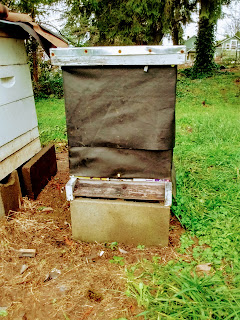Checking and Wrapping- Sticking Around, Obsessions
Its Christmas Day- and I was out today and yesterday checking on hives, and wrapping those I hadn't wrapped before, as we apparently have a rather cold spell coming on. By "wrapping"- I don't mean insulating- which I believe is a wasted effort, possibly harmful, but I thumbtack on a wrap of black, breathable, "weed barrier"- a good quality barrier I've written about before- and think is worth doing. Though, not essential- the hives would be fine-though maybe a little less fine?- without it.
 |
| Mud splashing up on a hive- and damaging base and lower boxes, is one great reason to |
My hives are painted white- great for hot weather, and just general appearance( I am fond of tradition), but maybe not so great for winter. Wrapping with black plastic, or tar paper, or bubble wrap - or anything like that, non- breathable material, is I believe, counter productive. The stuff I use breathes. And it protects my equipment. And more than anything I think- allows a hive that gets sun in winter to waken enough to move, readjust to its food source, or head out for a cleansing flight. Unlike a heavily insulated hive, which would miss the opportunity- an important one- entirely. Speculation, of course, which pretty much everything in beekeeping is. It's a rare thing to find a practice everyone agrees on. Something like the world at large- constantly divided.
 |
| First I put on an entry reducer cut from political signs |
 |
| Then I wrap it with a good quality weed fabric, which lasts forever. Maybe this is the fifth year of using it? Installed with thumbtacks. |
 |
| In this set of 3 hives, the center one was dead- overcome with mites I think. First death for the year- the obvious sign being a mass of dead bees in front. |
 |
| Five more hives on my back roof (down from nine). Wrapped and covered with a full CMU block on each. I didn't wrap hives for 25 years or so, but I like this method. |
But part of beekeeping for me isn't the actual beekeeping- it's being in this valley, and experiencing in a fuller way than I would otherwise. You see things you wouldn't see otherwise- I feel like I am here to stay- I've painted enough along the river's edges, walked it all over, and been enchanted again and again by the colors, and the way life happens between two hills in a valley heading north along the mountains (an unusual thing). It's different than other places- and very beautiful, despite the rapid growth, which chips away at it each day.
I want to be here. I'm pretty sure about that. If I were a younger man, maybe I'd try my luck further north, or east of the mountains, or Oregon- or figure a way to fit into a foreign culture. But I like what I know- and like beekeeping, even when you think you know it, there's much more to know. I am grateful to my mentor Brian for introducing me to beekeeping many years ago - among many other things he shared in our long friendship, bluegrass music, for example, and some friends who became very important to me. Those have all been a very big part of my life, and were not expected- more like things I was introduced to, and gained a life of their own- and I am glad (except the stings), for all of it
 |
| My constant companion in beekeeping-pushing 12 years now. Though of course, Ted Nugent (I didn't name him!) keeps a healthy distance from the hives. He sits 30 feet away and watches. |


Comments
Post a Comment